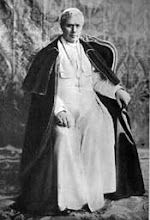Un extraordinariamente bien redactado y construído repaso sobre el divorcio, en inglés, que recomendamos vivamente. La verdad es que es de una de esas cosas que bien mereciera la traducción al portugués y al español.
Todo lo fundamental sobre el mismo desde el punto de vista católico y de la moral natural puede encontrarse en ese artículo que acabamos de enlazar.
Son de esas cosas que no deben dormir el sueño virtual de la pantalla, sino que deben imprimirse y encuadernarse. Y vivir, encarnados en papel, en nuestros anaqueles. No merecen la lectura rápida e informática a matacaballo, sino aquella otra reposada, con la pipa y el vaso de vino por escoltas en medio de la música callada.
Les dejo con un punto extractado de dicho artículo acerca de lo que la historia nos enseña acerca de la legalización del divorcio.
“As soon as the road to divorce began to be made smooth by law, at once quarrels, jealousies and judicial separations largely increased; and such shamelessness of life followed that men, who had been in favour of these divorces, repented of what they had done and feared that if they did not carefully seek a remedy by repealing the law, the State itself might come to ruin.
The Romans of old are said to have shrunk with horror from the first examples of divorce; but ere long, all sense of decency was blunted in their soul, the meagre restraint of passion died out and the marriage vow was so often broken that what some writers affirmed would seem to be true - namely, women used to reckon years not by the change of consuls but of their husbands.
In like manner, at the beginning, Protestants allowed legalized divorce in certain restricted cases; and yet, from the affinity of the circumstances of like kind, the cases for divorce increased to such extent in Germany, America and elsewhere, that all wise thinkers deplored the boundless corruption of morals and judged the recklessness of the laws to be simply intolerable.
Even in Catholic States, the same evil existed. For whenever at any time, divorce was introduced, the abundance of misery that followed exceeded all that the framers of the law could have foreseen. In fact, many set about to contrive all kinds of fraud and device and by accusations of cruelty, violence and adultery, to feign grounds for the dissolution of the matrimonial bond of which they had grown weary; and all this with so great havoc to morals that an amendment of the laws was deemed to be urgently needed.
Can any one, therefore, doubt that laws in favour of divorce would have a result equally baneful and calamitous were they to be passed in these, our days? There exists not, indeed, in the projects and enactments of men, any power to change the character and tendency which things have received from nature. Those men, therefore, show but little wisdom in the idea they have formed of the well-being of the commonwealth, who think that the inherent character of marriage can be perverted with impunity and who, disregarding the sanctity of religion and of the Sacrament, seem to wish to degrade and dishonour marriage more basely than was done even by heathen laws. Indeed, if they do not change their views, not only private families but all public society will have unceasing cause to fear lest they should be miserably driven into that general confusion and overthrow of order which is even now the wicked aim of Socialists and Communists.
Thus we most clearly see how foolish and senseless it is to expect any public good from divorce when, on the contrary, it tends to the certain destruction of Society.”
(Leo XIII: Encycl. Arcanum Divinae Sapientiae, Feb. 10, 1880, M. 181-183.)
Rafael Castela Santos
terça-feira, dezembro 06, 2005
Sobre el divorcio
Publicada por
Rafael Castela Santos
à(s)
terça-feira, dezembro 06, 2005

Enviar a mensagem por emailDê a sua opinião!Partilhar no XPartilhar no FacebookPartilhar no Pinterest
Subscrever:
Enviar feedback (Atom)
















0 comentários:
Enviar um comentário